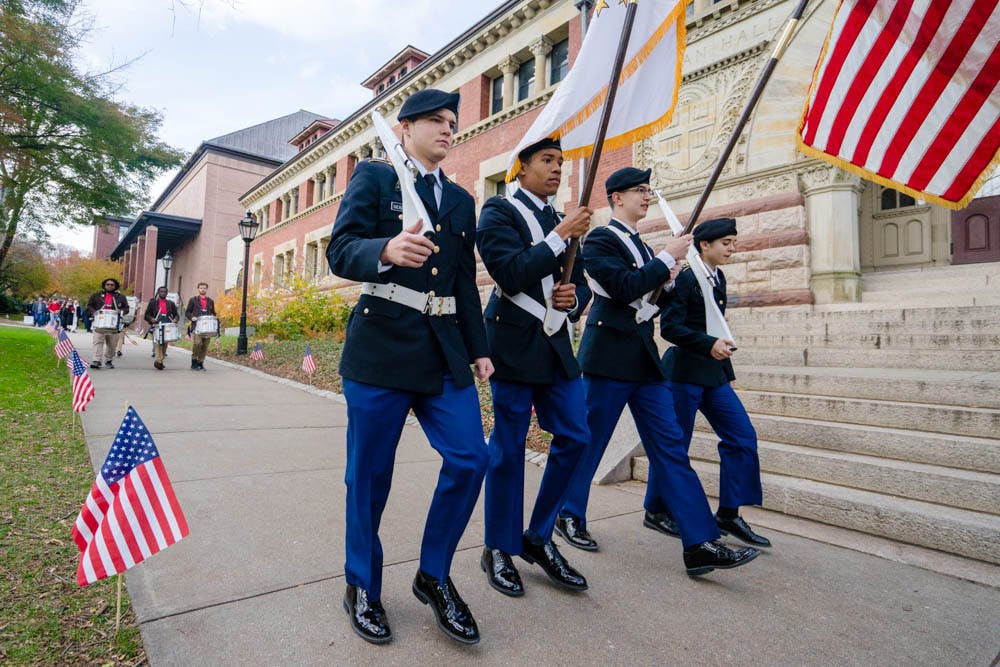The University will eliminate out-of-pocket costs for all undergraduate veterans and make applications need-blind for prospective student veterans, President Christina Paxson P’19 announced at the Veterans Day Ceremony Monday afternoon.
The University also plans to eliminate the standardized test score requirement from the application process for student veterans. These changes will impact applicants starting with in the 2020-21 school year.
These policies collectively aim to more than double the population of undergraduate veterans on campus by 2024. There are currently 21 undergraduate veterans on campus.
In addition to these changes, the University will partner with Service to School’s Vetlink program, which helps veterans gain admission to highly selective universities by assisting them collect letters of recommendation and navigating the college application process, according to its website.
“It’s essential to expand support and create new pathways, both to honor their service and to enhance the education of every student who benefits from the unique lived experiences and perspectives that our veterans contribute to campus,” Paxson said in a Monday press release.
To eliminate all out-of-pocket costs toward tuition and fees for veterans and their dependents, the University will increase the value of Yellow Ribbon scholarship awards, wrote Vice President of Communications Cass Cliatt in an email to The Herald. The award is a provision of the Post-9/11 GI Bill that allows approved private institutions to fund the tuition of veterans. Currently, the University caps its Yellow Ribbon contribution at $10,000 per student veteran, which is matched by the U.S. Department of Veterans Affairs. The University has not yet specified the amount by which the value of this scholarship will increase, but will rely on a previous anonymous gift to begin funding the increased aid, which will cost an additional $1.5 to $2 million a year. The University is also currently assessing the possibility of implementing the increased aid this year, Cliatt wrote in a follow-up email to The Herald.
The University has already begun a campaign to fundraise the additional $25 million required to maintain need-blind student veteran admissions, Paxson said at the event.
Michael Muir ’20, a former U.S. Marines combat engineer, said that increasing the enrollment of student veterans would support the University’s commitment to forming a student body representative of the nation’s demographics. “I think the veteran demographic is one that does represent this country. I know Brown strives to mirror the social fabric of this country,” Muir said. He described the primary current obstacle for veterans to attend the University as “financial accessibility.”
Muir called the initiative to more than double the veteran population in five years an “admirable goal,” but he hopes to see Brown “go beyond” that number.
Army veteran Conall Finn ’22 added that the University’s financial barriers and lack of need-blind admissions have previously limited the population of veterans on campus.
“The biggest challenge the University has right now in attracting the caliber of veteran who can come to Brown and succeed is the financial policies,” Finn said. Since many student veterans apply as transfer students, they cannot benefit from need-blind admission policies like non-transfer students.
The elimination of standardized testing will also help open up the University to more veteran applicants, said Maxx Cummings ’21, who served in the air force.
“There’s a lot of talented veterans, smart guys and gals out there who don’t have standardized test scores,” Cummings said. “It’s another thing they have to do before applying.”
Muir added, “They’re thinking, ‘I don’t have the time or discipline to study right now, I’m deployed to Afghanistan, and there’s no way I can compete with a typical Ivy League student.’”
This is not the first time the University has expanded its efforts to increase the number of student veterans. In 2017, the University announced it would waive the application fee and guarantee phone interviews for veterans who complete an undergraduate application, The Herald previously reported. In addition, the Resumed Undergraduate Education program — which allows students who have delayed their formal education for six or more years to apply through a separate application pool — has attracted many veterans.
“It’s 100 percent the reason why (Aimee and I) are at Brown,” said Joel Fudge ’21, who learned about the RUE program while he and his wife were students at the Community College of Rhode Island. Aimee Chartier ’21, recruitment and retention coordinator at the Office of Military-Affiliated Students and a Marine veteran, led the Veterans Day Ceremony on Monday.
Kimberly Millette, program director at the Office of Military-Affiliated Students, said that student veterans crucially enrich the education of non-veteran students at the University.
“Many students at highly selective institutions such as Brown proceed to careers in public service, and some will become the members of Congress who make decisions about whether we go to war,” Millette said in the University press release. “To not interact with veterans or service members would be a disservice to any future leader — for that reason alone, the presence of veterans on every campus is essential.”

Will Kubzansky was the 133rd editor-in-chief and president of the Brown Daily Herald. Previously, he served as a University News editor overseeing the admission & financial aid and staff & student labor beats. In his free time, he plays the guitar and soccer — both poorly.





